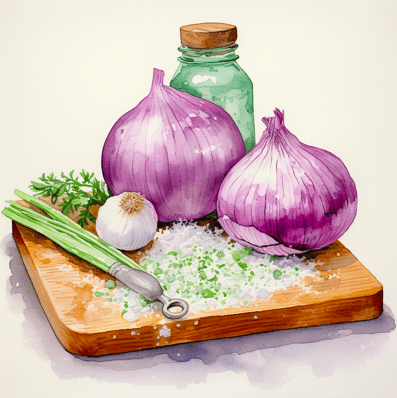
Don’t want to read the whole post?
Granulated onion offers a convenient, milder flavour with a long shelf life, ideal for quick seasoning. Minced onion provides a fresh, strong onion flavour, perfect for enhancing soups, stews, and sauces. Both are great choices for a healthy, plant-based diet.
ABOUT ME
Be beauty. Be plant-based!
As a former Registered Nurse and avid plant-muncher, I’m in love with how simple plant-based foods make it easy to be beautiful.

You’ll also love:
Cilantro vs. Celery: Telling the Difference
When it comes to enhancing the health and flavour of your plant-based diet, the choice of onion type plays a pivotal role. Granulated onion and minced onion is one of the choices that could really impact the flavour and success of your dish. So, understanding the differences and best uses of these onion forms is crucial. Today we explore the comparison of Granulated Onion vs Minced Onion and I hope if offers you insight into making the best choice for your recipes.
Granulated Onion
Granulated onion, made from dehydrated onions, offers a versatile and convenient option for busy cooks. This form of onion is ideal for those seeking to add an oniony flavour to dishes without the hassle of chopping fresh onions. Even better, they help you avoid the inevitable and uncomfortable onion tears.
Its longer shelf life and ease of storage (best kept in a dry place in an airtight container on your spice rack) make it a reliable pantry staple.
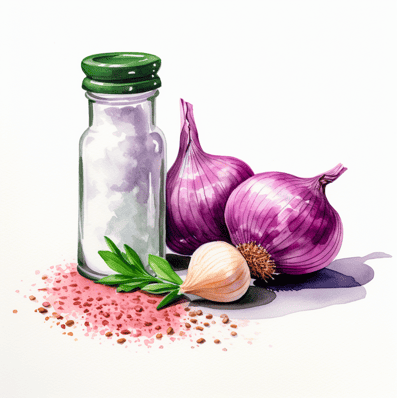
Granulated onion stands out for its coarse texture and milder taste compared to its fresh counterpart.
This makes it a perfect choice for adding a subtle onion flavour to a variety of dishes, from soups and stews to marinades and seasoning blends.
Unlike the strong onion flavour of raw onions or white onions, granulated onion provides a more toned-down flavour, making it a great way to introduce onion flavour into your dishes without overpowering them.
The Charm of Minced Onion
Minced onion brings a different dimension to the kitchen, primarily using fresh onions or white onions that are chopped into fine onion pieces.
This type of onion is perfect for those who appreciate a strong onion flavour in their dishes. The fresh ingredient brings a vibrancy that’s hard to match with dried or dehydrated forms of onions.
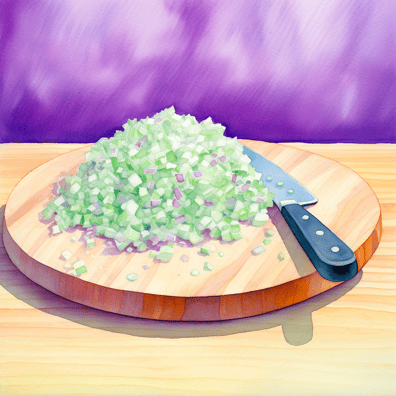
When you use minced onions, you are not just adding flavour but also texture. The tiny, juicy bits of minced onion infuse a fresh onion flavour and a pleasant bite to your meals, making them ideal for lively dishes like stir-fries, savory sauces, and hearty soups.
Rich in vitamins and minerals, minced onion is not just a taste enhancer; it’s a nutritional powerhouse. It’s an excellent source of vitamin C, potassium, and iron, essential for a health-conscious diet.
Granulated vs Minced Onion
When comparing granulated onion and minced onion, the primary differences lie in their form, texture, and flavour.
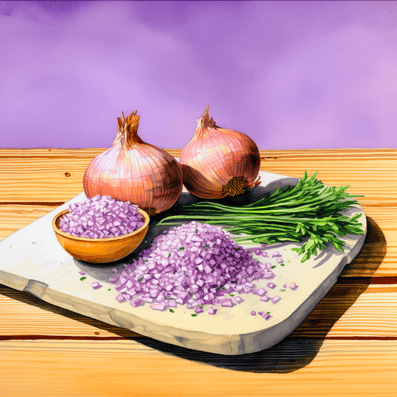
Granulated onion, which comes in the form of onion granules or dried onion, offers a coarser texture and a milder taste. This makes it a versatile addition to your seasoning blends, adding a gentle onion undertone without overwhelming other flavours.
On the other hand, minced onion, with its soft and juicy texture, delivers a stronger flavour and more pronounced taste of onion. It’s perfect for dishes where the onion pieces themselves are a key component, adding both flavour and texture. The amount of flavour provided by minced onion is more intense, making it the best option for dishes that require a bold onion presence.
Table: Granulated onion vs minced onion
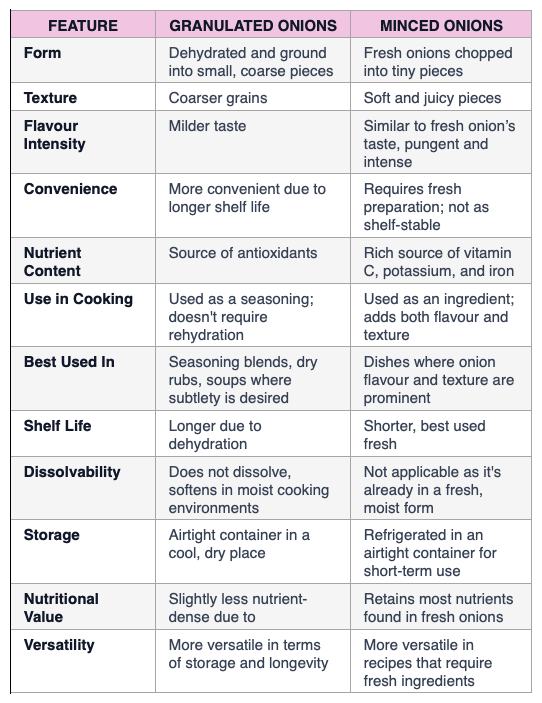
When it comes to using these two types of onions in cooking, understanding the conversion ratios and substitutes is essential.
How much granulated onion equals a cup of fresh minced onion?
Typically, one tablespoon of granulated onion can substitute for about a half cup of fresh minced onion. This conversion is helpful when you have granulated onion on hand and a recipe calls for minced onion.
The versatility of onions also extends to their substitutes.
What is the best substitute for granulated onion?
In situations where granulated onion isn’t available, onion flakes, onion salt, or even a common onion can serve as excellent substitutes. These alternatives maintain a similar oniony flavour and can adapt to the terms of flavour you are aiming for in your dish. Each substitute brings its own unique twist, whether it’s the stronger flavour of onion salt or the more pronounced texture of onion flakes.
Granulated Onion in the Kitchen
In the kitchen, granulated onion holds its own as a valuable ingredient. Its role in seasoning blends is unparalleled due to its ability to integrate well with other spices. Its coarser texture makes it an ideal ingredient for dishes where a hint of texture is desirable. As a dry onion product, it’s a convenient addition to your spice rack, ready to use without any prep work.
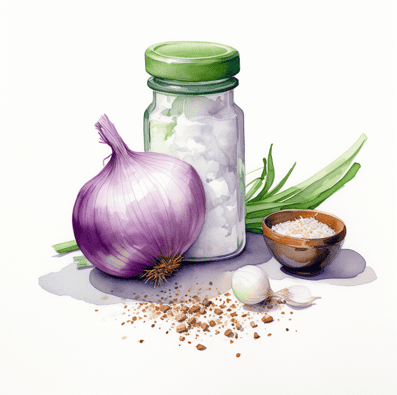
Storing granulated onion correctly is vital for preserving its quality. Keep it in an airtight container in a dry place to maintain its potency and prevent clumping. When it comes to processing granulated onion, a food processor can be used to adjust the particle size, if a finer texture is required. This feature makes it a flexible ingredient, suitable for a variety of savoury dishes.
Minced Onion in Recipes
Minced onion shines in recipes where the fresh onion flavour and its texture play a crucial role. It’s a fresh ingredient that brings a great flavour to the table, especially in dishes where onion pieces are desired for their crunchy and juicy texture.
When you use minced onion, you’re not only adding a strong onion flavour but also enhancing the dish’s overall sensory appeal. It’s perfect for stirring into soups, stews, and sauces, where its texture and flavour can really stand out.
Minced onion also works well in raw dishes like salads and salsas, where its fresh onion flavour and crisp texture are particularly desirable. When replacing granulated onion with minced, keep in mind the different amount of flavour each brings to the dish. A cup of fresh minced onion can be used to add both taste and texture to your recipes, making it an essential ingredient in a health-conscious kitchen.
Health and Nutrition
Both granulated and minced onions offer significant health benefits, making them excellent choices for a plant-based diet.
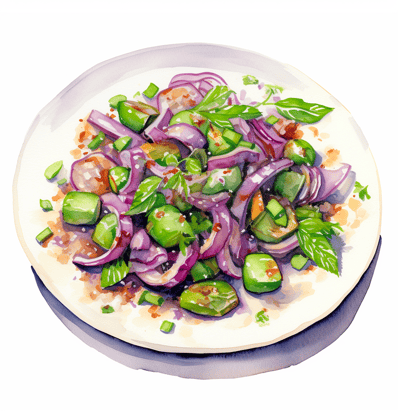
Minced onions, being less processed, retain more of their original nutrients, including vitamins and minerals essential for maintaining good health. Their anti-inflammatory properties are particularly beneficial for those with conditions like acne, arthritis or asthma.
Granulated onion, while slightly less nutrient-dense due to the dehydration process, still provides many health benefits. That said, it is a convenient option for those looking to reduce prep time in the kitchen while still incorporating healthy ingredients into their meals. Something is still better than nothing. Its long shelf life and ease of storage make it a practical choice for busy lifestyles.
Granulated Onion vs Minced Onion
In our exploration of Granulated Onion vs Minced Onion, we’ve discovered that each brings its unique strengths to the kitchen. Whether you opt for the convenience and longer shelf life of granulated onion or the fresh, robust flavour of minced onion, both forms are invaluable in a health-conscious, plant-based diet. Remember that the choice between granulated and minced onions isn’t just about taste—it’s about creating meals that are both nourishing and delightful to the senses. Keep experimenting with these versatile forms of onion to find the perfect balance for your recipes and lifestyle.
FAQ: Granulated Onion vs Minced Onion
1. Can you substitute minced onion for onion powder?
Yes, you can substitute minced onion for onion powder. However, the texture and intensity of flavour will differ. Generally, a tablespoon of onion powder can be replaced with about half a cup of minced onion. This substitution works well in recipes where the texture of minced onion won’t affect the dish significantly.
2. What is a substitute for minced onion?
If you’re out of minced onion, good substitutes include onion powder, onion granules, or onion paste. In terms of fresh alternatives, green onions or red onions finely chopped can be used. Each of these substitutes will add a similar flavour profile to your dishes, though the texture and intensity of flavour may vary.
3. What do you do with onion granules?
Onion granules are a versatile ingredient used in a variety of dishes. They can be added directly to soups, stews, marinades, and seasoning blends. Onion granules provide a concentrated oniony flavour without the moisture of fresh onions. They are also great for making homemade onion powder by grinding them into a fine powder.
4. Does granulated onion dissolve?
Granulated onion does not completely dissolve like onion powder or find powder but tends to soften and blend well in moist cooking environments. It’s a great choice for recipes where a subtle onion texture is desirable. It’s important to note that granulated onion will not provide a completely smooth texture like onion paste or onion powder.
5. How do you store onion granules?
Store onion granules in an airtight container in a cool, dry place to maintain their potency and flavour. Proper storage prevents moisture and other contaminants from affecting the quality of the granules. This way, they can retain their flavour of onion powder and stay fresh for a longer period.
Additional Tips
- If you need a stronger onion flavour, consider using a teaspoon of onion powder in your recipes.
- For a different flavour profile, garlic powder can be an excellent substitute in dishes.
- When measuring, remember that a little onion powder goes a long way in terms of flavour.
- For the best onion powder substitute, consider the specific needs of your recipe and the desired flavour intensity.